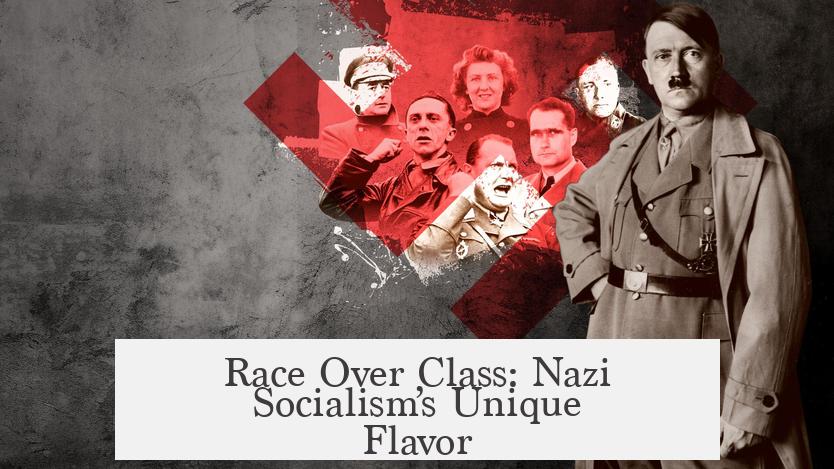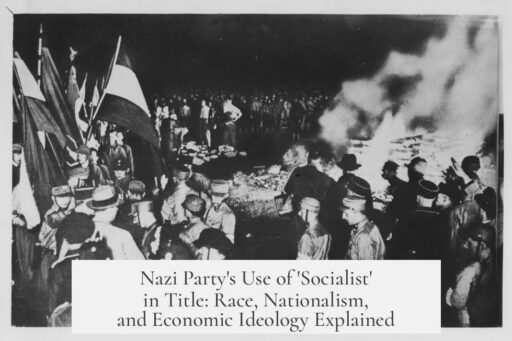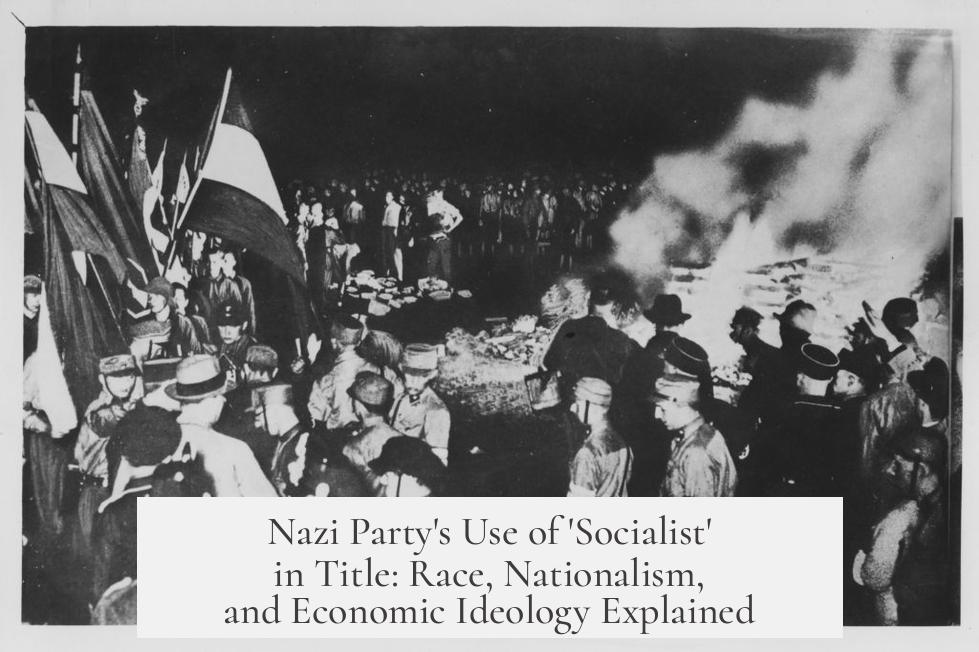The Nazi Party used ‘Socialist’ in its official title to signify a concept of socialism that diverged sharply from traditional socialist doctrine. Their version of socialism emphasized racial nationalism and communal sacrifice rather than Marxist economic principles.
The term “National Socialist” combined two powerful ideas in Nazi ideology. The word “National” reflects a focus on ethnic and racial identity. For Hitler and the Nazi Party, nationalism was inseparable from race. They believed the German nation comprised a racial community defined by “pure” German blood. This racial nationalism excluded groups such as Jews, whom Nazis claimed were not truly German.
Socialism, in the Nazi context, was not about class struggle or economic equality. Instead, it represented a call for loyalty and sacrifice to the racial community, also known as the Volksgemeinschaft, or people’s community. This meant every German’s efforts and wealth should benefit the nation as a whole, not individual profit. Traditional socialism prioritizes economic democracy and social ownership; Nazi socialism prioritized racial unity and ideological conformity.
Hitler’s view of socialism appeared in his writings, such as Mein Kampf, where he criticized Marxist socialists for distorting socialism. He claimed his conception of socialism was superior as it integrated racial and national loyalty. This racialized socialism aimed to unify ethnic Germans behind a common purpose—strengthening the “master race” through political and social sacrifice.
The Nazis did not develop a detailed economic program. Hitler opposed both capitalism and communism, associating them with Jewish conspiracies to undermine Germany. This position boiled down to rejecting capitalist self-interest and communist internationalism. Instead, Nazi policies favored a controlled economy that protected German industry and workers but subordinated economic activity to racial goals.
- Profit-making was seen as a Jewish characteristic, incompatible with the German duty to their racial community.
- Individual achievement was respected only when it benefited the Volksgemeinschaft.
- Economic productivity was expected to support national strength, not personal wealth.
This concept of socialism was therefore ideological and racial more than economic. It motivated Germans to sacrifice personal interests for the preservation and promotion of the racial nation.
Marxist and Soviet thinkers historically rejected the Nazi claim to socialism, labeling it a form of reactionary capitalism. They viewed Nazism as the extremity of capitalist exploitation, not as a genuine socialist movement. Consequently, there has been consistent ideological opposition to recognizing the Nazis as truly socialist.
| Aspect | Traditional Socialism | Nazi “Socialism” |
|---|---|---|
| Economic Model | Social ownership, class struggle, economic equality | Racially-driven communal loyalty, no clear economic plan |
| Primary Allegiance | Working class and international solidarity | Ethnic Germans and racial nationalism |
| View of Profit | Often rejected or regulated in favor of equality | Profit was suspect if prioritized over racial community |
| Relation to Race | Generally race-neutral or anti-racist | Centrally racial; race defined nation and policy |
| Ideological Foundations | Marxist, class-oriented | Racial purity, national superiority |
Using “Socialist” in its name gave the Nazi Party an appeal to various discontented groups during the 1920s and 1930s. It distinguished them from both communist parties and traditional right-wing conservatives. Their version of socialism promised unity and strength for the German people defined racially. However, this was a nationalist and racial ideology, not an economic or social program rooted in Marxism.
Key takeaways:
- The Nazi use of “Socialist” reflects a racial and nationalist ideology, not Marxist socialism.
- “National” signifies ethnic German racial identity central to Nazi beliefs.
- Nazi socialism rejected class struggle and economic equality in favor of loyalty to the racial community.
- Hitler opposed both capitalism and communism, promoting a racially oriented economy.
- Marxist critics dismissed Nazi socialism as a false or reactionary form of socialism.
Why did the Nazi Party Use ‘Socialist’ in Its Official Title?

The Nazi Party used ‘Socialist’ not in the traditional Marxist sense but as a racial and nationalist ideology, demanding sacrifice for the German racial community rather than promoting class struggle or economic equality. It’s a twist that trips up many who glance at the party’s official name, the NSDAP (Nationalsozialistische Deutsche Arbeiterpartei). But what lies beneath that name reveals a very different story than the one most expect.
Why did Hitler and his cronies slap the word “socialist” onto a party that crushed unions and allied with big industrialists? Let’s dig in.
Redefining Socialism: Hitler’s Take vs. Marx’s Vision
When you hear *socialism*, your mind probably jumps to Karl Marx and his vision: wealth redistribution, class struggle, worker control, and dismantling capitalist structures. That’s the textbook definition many held in the early 20th century. But Hitler? Not on your life. He thought Marxists had twisted socialism into something corrupt and useless.
In his infamous manifesto, Mein Kampf, Hitler repeatedly bashes Marxists and claims he alone had the “true” socialism. But instead of looking at economics, he focused on race and nationalist unity. For him, socialism was a collective duty to one’s racial community—the Volksgemeinschaft—rather than a call to topple capitalism.
Don’t Miss “National” in National Socialist
There’s a little word that changes everything: “National.” It’s right there, preceding “Socialist” in the party’s name for a reason. The Nazis weren’t about international worker solidarity. They wanted a racialized nationalism, meaning the nation was defined by blood and ethnicity.
For the Nazis, being German was not about geography or language alone. It was about having “pure” German blood. Jewish Germans? Not really German in their eyes. This racial nationalism was the core of their identity, fusion of state and race, making their socialism unlike anything Marxists imagined.
Race Over Class: Nazi Socialism’s Unique Flavor

So when we say Nazi socialism, think *race* instead of *class*. Hitler called on Germans to sacrifice personal profit and freedom for the racial community. This was not socialism that preaches workers seizing factories but racial unity demanding loyalty and subordination of the individual to the race.
This wasn’t about economic justice or redistributing wealth. It was ideological sacrifice to ensure the strength and purity of the “master race.” In fact, traditional ideas of socialism and economic class struggle were upended and replaced by a vision centered on racial hierarchy and authoritarian unity.
Hitler’s Economic Vagueness: No Program, Just Conspiracy
Surprisingly, Hitler never delivered a detailed economic plan. Instead, his economic views were fuzzy, guided by paranoia and antisemitic conspiracies. He despised both capitalism and communism, blaming a shadowy Jewish cabal for Germany’s problems.
In his half-baked economic thinking, German creators had a right to their work, but they existed only within the Volksgemeinschaft. Their efforts must serve the racial community. Pursuing profit alone was condemned as a “Jewish” trait, while Germans were expected to prioritize communal welfare.
The Marxist and Soviet Rejection of Nazi Socialism
Soviet and Marxist theorists have long shot down the idea of Nazi socialism. Since the late 1920s, they labeled Nazism as a product of late-stage capitalism, fascism’s brutal cousin, rather than a form of socialism.
This rejection served political purposes, positioning Nazism as the enemy of the proletariat and socialism, rather than something closer. They even ridiculed the Nazis for daring to call themselves socialists.
Yet, this ignores the fact that the Nazis *did* use “socialist” to appeal to certain social groups and emphasize a different form of community loyalty.
Why Did the Nazis Use “Socialist” Then?

Think of the word “socialist” as bait, a multipurpose label. It helped the Nazis attract workers unhappy with capitalism but wary of Marxism — working-class folks who wanted strong leadership and national pride.
Plus, the label allowed Hitler to claim he offered a new, superior form of socialism — one that promised unity and racial purity instead of class conflict. It separated them from communists and capitalists alike, presenting the Nazis as Germany’s “third way.”
There was also a marketing edge. “Socialist” sounded progressive and modern during a volatile time when workers’ rights and economic justice were hot topics. The Nazis slapped it on to win votes and mask their brutal racial agenda behind a veneer of populism.
Practical Takeaways from This Naming Strategy
- Labels can be misleading: Just because the Nazis used “socialist” doesn’t mean they embraced socialism’s core principles.
- Words serve strategy: Names and terms are often chosen to appeal to target groups, even if they don’t fully reflect ideology.
- Ideology can be twisted: Ideologies like socialism can be redefined and morphed to fit radical goals.
Engage Your Curiosity: What This Means Today
Ever wonder how political groups sometimes hijack popular words to gain support? The Nazis took “socialist” and rewrote it to promote a deadly racial doctrine. It’s a stark reminder to look deeper than party names or slogans.
Does this change how you view political labels? How carefully do you evaluate the words behind current political parties? One must always ask: What’s the real ideology beneath the campaign slogans?
Summary: The Nazi Party’s Socialist Label Was About Race and Nationalism, Not Marxist Economics
In short, the Nazi use of “Socialist” in its official name relates to a distorted ideology. It fused racial nationalism with a call for communal sacrifice. This “socialism” rejected Marxist economic redistribution, privileged racial purity, and demanded loyalty to the Volksgemeinschaft above all.
Hitler’s vision was never about workers’ rights or class struggle but about uniting a racial community under a totalitarian regime. The word “socialist” was part ideology, part propaganda, all wrapped in racial supremacism.
Next time you see political party names, remind yourself: sometimes, the name says more about marketing than meaning. And that lesson is as true today as it was in 1930s Germany.




